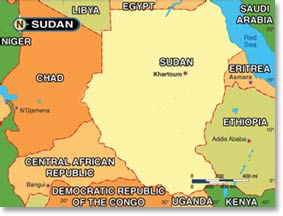- Sudan needs help, not sanctions – A report from Darfur (FCN, 09-23-2004)
- Sudan Government and southern rebels sign peace pledge before Security Council (UN News Center, 11-19-2004)

NEW YORK (FinalCall.com) – “The question of the Sudan is a complex issue,” Elombe Brath, of the Harlem-based Patrice Lumumba Coalition, stated during a forum on the Sudan in the Dempsey Center on West 127th Street on Nov. 6. He said that the Sudan was an important nation because of its strategic importance as a link between, what he termed, the Middle East and sub-Saharan Africa.
“My concern right now is that as Africans in this country–Muslims and Nationalists who most of the time work together on issues affecting our people–that we again work together to deal with this question and not be up-tight,” he stressed.
Before the panelists offered their positions, Omowale Clay, a member of the Brooklyn, N.Y.-based December 12th Movement, the forum’s moderator, told the audience that they had come to the right place to hear what was going on in the African nation.
“You will leave the meeting much more informed about the situation,” Mr. Clay stated.
Joining Mr. Brath on the panel were Professor James Allen, Africans Helping Africans; Minister Akbar Muhammad, International Representative of the Nation of Islam; Professor Asha A. Samad, Director of The Human Rights Center at the City College of N.Y.; Imam Al-Hajj Talib Abdur-Rashid, Mosque of the Islamic Brotherhood, Inc.; and Rahama Dehallah representing the Darfurian Association of New York.
“The challenge today is that there is a war against Islam,” offered Min. Akbar. “A part of that war against Islam is to break up Africa,” he added. The Muslim minister then told the audience that he had traveled to the Sudan three times.
“The propaganda, and what pains me is we allow our enemies, especially the Zionists, to give us agendas,” he said, noting the example of the issue of slavery in the Sudan, which was given to Blacks as an agenda in the early 1990s. He then revealed the target of the Zionist agenda.
“They used this false issue of Arabs enslaving Black people as a way to attack and discredit the Honorable Minister Louis Farrakhan,” he argued. The Zionists wanted Black people to rise up against the Sudan, he said. Today, they have given a new agenda to Black people, he insisted.
Min. Akbar then challenged the audience to examine the reasons for the continuing propaganda program against the largest nation in Africa. The plan is to break up that nation, he charged.
“There are large deposits of oil, which are yet untapped. There is uranium, gold and the most important resource is the vast reserves of water that flow under the sands in the Sudan. They want to control those resources,” he maintained. He also said the Zionists are concerned about the influence of Islam among the descendants of slavery in America.
“I went to Darfur, there is a crisis in Darfur,” Min. Akbar told the audience. “And if the churches and the schools want to do something for the people there, what we should be doing is to gather food, clothes and medicine for the Darfurians now in the camps,” he stressed, adding that the government in Khartoum has admitted their mistakes, but genocide is not one of them. “There is a reason why America has put this issue on the front page,” he contended.
Professor Allen gave the audience a history lesson on the nation he said was also known as “Bilal al-Sudan” (the land of the Blacks). He reminded everyone that the Sudanese received their independence in 1956, almost a year ahead of Ghana. He said that the people of Darfur put up the greatest resistance against British colonialism.
“Unfortunately, Darfur has become a neglected area. It is an area larger than France,” observed Prof. Allen. “The Sudan, in general, has come into the purview of the West only because of its oil riches,” he insisted.
“We have to find out what is really behind all of this and support the ending of this conflict,” Prof. Samad said, stressing that only through continuous discussion could a lasting solution be found. And then the professor issued a warning to the audience.
“We need to be part of the solution, not part of the problem,” Prof. Samad said, added that the goal should be to unite on the issue of the Sudan–without U.S. government intervention.
Imam Rashid told the gathering that they must always guard against the media campaign of misinformation, as far as Africa was concerned, and in the Sudan in particular.
“You must seek out all the media resources available to you, not just the western press,” he urged.
A member of the Darfurian Association told the audience that his people wanted to gain their rights by peaceful means but, in February 2003, they believed that armed resistance was necessary.
“We have a strong belief that the government in Khartoum has offered our lands to the land-less rebels,” he argued.
On Nov. 10, a spokesman for United Nations Secretary-General Kofi Annan issued a response to an agreement signed by the actors in the Sudan problem on the ground.
“The secretary-general warmly welcomes the signing of the ‘Protocols on the Improvement of the Humanitarian and Security’ situation in Darfur by the Sudanese government, the Sudan Liberation Movement and the Justice and Equality Movement in Abuja on November 9,” the statement said. He is hopeful that these measures, combined with the expanded mission of the African Union, will re-establish security and stability in the region, the statement added.
William 13X contributed to this article.












